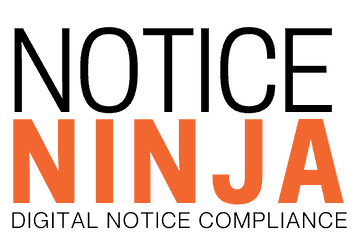Yes, NOTICENINJA is corporate tax notice compliance software that automates key workflows including notice assignments. The platform employs a rule-based system that can manage multiple level rules and ensure notices are directed to the appropriate stakeholder. As a result, you’ll never have to worry about notices being misdirected or slipping between the cracks.

5 Practical Ways to Solve Corporate Tax Notice Delinquency Problems
.png?width=1000&name=Amanda%20Reineke%20CEO%20Co-founder%20(40).png)
20 August
Corporate delinquency tax notice management is crucial in avoiding costly penalties and maintaining your company's good standing. If your company receives a delinquency notice from the IRS, it means there's an issue with unpaid tax debt. The notice will detail the amount you owe and the steps you need to take. Here's a quick breakdown of what you should do:
- Review the notice
- Verify your records
- Respond promptly
- Set up a payment plan if needed
- Utilize automation software like NOTICENINJA
Ignoring a delinquency notice can lead to fines, penalties, and even jeopardize your business operations. It's crucial to address these issues immediately and efficiently.
About the Author
I'm Amanda Reineke, CEO and Co-founder of Notice Ninja, Inc. With years of experience in corporate delinquency tax notice management, I’ve dedicated my career to helping businesses streamline their compliance processes. Let's dive into what to do when you get a delinquency notice and how Notice Ninja can help.

Understanding Corporate Delinquency Tax Notices
What is a Corporate Delinquency Tax Notice?
A corporate delinquency tax notice is a formal communication from the IRS or state tax authorities indicating that your business has failed to meet its tax obligations on time. This could mean you haven't filed a required return or haven't paid the taxes due. These notices are serious and can lead to severe consequences if not addressed promptly.
When you receive a delinquency notice, it often includes details about the amount owed, any penalties and interest accrued, and the actions you need to take. It's essential to understand the contents thoroughly to take the appropriate steps.
Delinquency penalties can add up quickly. For example, the IRS charges a failure-to-pay penalty of 0.5% of the unpaid taxes for each month the tax remains unpaid, up to 25% of the total amount due. Additionally, interest accrues on both the unpaid taxes and the penalties, compounding the debt over time.
Common Reasons for Receiving a Delinquency Notice
Businesses can receive delinquency notices for several reasons, most commonly:
- Failure to File: If you don't file your tax return by the due date, you will receive a delinquency notice. This applies to various tax types, including sales and use tax, corporate income tax, and payroll tax.
- Failure to Pay: Even if you file your return on time, failing to pay the taxes owed can trigger a delinquency notice. The IRS and state tax authorities expect timely payments and will impose penalties and interest on overdue amounts.
- Sales and Use Tax Compliance: Retailers in states with sales taxes must report and pay sales and use tax obligations. Missing a deadline or underreporting can result in a delinquency notice.
- Tax Lien: If the tax debt remains unpaid, the IRS may file a Notice of Federal Tax Lien. This lien gives the IRS a legal claim against your property and can affect your credit score and ability to secure financing.
- IRS Certification: In extreme cases, if your tax debt is considered "seriously delinquent" (over $62,000), the IRS can certify your debt to the U.S. Department of State. This certification can result in the denial, revocation, or limitation of your passport.

Understanding why you received a delinquency notice is the first step in resolving the issue. Reviewing your records and ensuring you comply with both IRS and state tax obligations can help prevent future notices.
5 Practical Ways to Manage Corporate Delinquency Tax Notices
Review and Understand the Notice
When you receive a delinquency notice, it’s crucial to review the entire notice thoroughly. Skim it first to get a basic understanding, then read it in detail to grasp all the action items and deadlines. This helps you understand the type of notice, the amount owed, and any penalties or interest.
Verify Your Records
Next, review your company’s records to ensure the notice is accurate. Sometimes, notices are sent in error. Check if you’ve already made the payment or if there were any discrepancies in your previous filings. If you have proof of payment, gather it to dispute the notice. Accurate information is vital for resolving disputes efficiently.
Respond Promptly
It’s essential to respond immediately to any delinquency notice. Depending on the situation, you might need to send proof of payment or make the payment itself. Contact the IRS or relevant state tax authority and explore your payment options, including installment agreements. Quick responses can help mitigate additional penalties and interest.
Set Up a Payment Plan
If you can’t pay the full amount immediately, consider setting up a payment plan. The IRS offers installment agreements and options like an offer in compromise for those facing financial hardship. Discuss these options with a tax professional to find the best solution for your situation. Payment plans can help you manage your tax debt without overwhelming your finances.
Utilize Automation Software
Automation software like NOTICENINJA can streamline the process of managing tax notices. This software uses OCR technology to scan notices, create detailed records, and automate tasks. This ensures that responses don’t fall through the cracks and helps maintain compliance. By using automation, you can save time and reduce the risk of missing critical deadlines.
By following these practical steps, you can effectively manage corporate delinquency tax notices and maintain compliance. In the next section, we will explore how proactive management and automation software like NoticeNinja can help your business stay ahead of tax obligations.
Managing corporate delinquency tax notices can be a daunting task, but with the right approach, it becomes manageable. Proactive management is key. By staying ahead of your tax obligations, you can avoid many of the pitfalls that lead to delinquency notices.
NOTICENINJA is here to help. Our platform offers a comprehensive solution for corporate delinquency tax notice management. We use advanced automation software to streamline the entire process. With NOTICENINJA, you can scan notices, create detailed records, and automate tasks. This reduces the risk of missing critical deadlines and helps maintain compliance effortlessly.
Automation software is a game-changer. It not only saves time but also ensures accuracy. By leveraging NOTICENINJA, your team can focus on more strategic tasks rather than getting bogged down by manual data entry and follow-ups.
In conclusion, staying compliant and managing tax notices doesn't have to be overwhelming. With proactive management and the right tools, you can keep your business on track. Consider integrating NOTICENINJAinto your workflow to simplify and enhance your tax notice management process.
Learn more about how NOTICENINJA can help you master tax notices here.
This wraps up our guide on managing corporate delinquency tax notices. We hope you found these insights helpful and are ready to take the next step towards efficient tax compliance.
